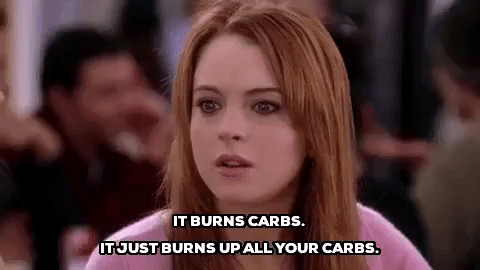What's up, friend? I hope you've been having a good summer. It's hot here in Arkansas. I lost two pounds of water today on my run, so there's that (shame on me for not properly hydrating. Don't be like me). Hey, speaking of losing weight, can we talk about it? I'm getting more and more questions from confused friends and family (understandably so) regarding the onslaught of diet ads and products that show up in their social media feeds in the summer months.
In conversation with my sister regarding all of the confusion out there, she said "Hey, you should write about this." Don't mind if I do. If you don't want to read about it, it's okay. Life's too short to read stuff that doesn't interest you. But if you're into it and want to learn a little bit right now, pull up a chair. There's always a spot for you at this schoolhouse rock- Jolly-edition-table.

I've put together 5 main points to consider and things to expect when it comes to losing fat. These points stem from the most commonly asked questions that have come up during conversations I've had with REAL LIVE human beings that are confused as to how to navigate this topic. Without further adieu, here's part 1 of "5 things you need to know about weight loss."
1) "I want to lose weight" = "I want to lose fat."
We can all lose 5 pounds in a day through dehydration and waste, but unfortunately water and poop aren't fat mass. What's the point of losing 10 pounds of water if your fat mass stays the same? We are conditioned to believe that all that matters is the number that pops up on the scale. Heads up, that number can fluctuate between 5-10 pounds (depending on your current weight and height) at any given time simply due to changes in hydration status and hormones, not actual fat loss or gains.
What it boils down to here is that when we say we want to lose weight, what we really mean is that we want to lose fat. Your organs, bones, muscles, waste, water, and fat mass make up your total weight. Aesthetic (visual) changes come from losing fat mass, not all the other stuff. So, while losing 5 pounds of water may make you feel better in your noggin because it registers as "weight loss" on the scale, remember that a scale can't tell you where you're losing weight from (muscle, fat, waste, water). Fat loss doesn't happen 10 pounds at a time, it happens at a much slower rate. We'll talk about that in part 2.
Instead of focusing on one specific number, it's better to accept the fact that your body is fluid when it comes to total weight because the status of hydration, waste, hormones, and inflammation from muscle soreness constantly varies. I like to think of weight more as a range. For example, if you weigh yourself 3 times a day every day (morning, noon, and night) for a week, you may find that your weight fluctuates between a low of 151.4 and a high of 157.8. That's normal. So, when you start a new diet, it'd be best in this case to start looking for new lows after a few weeks. A shift from a range of 151.4-157.8 to a new range of 149.7-156.2 after a week or two indicates that you are in a calorie deficit and losing fat mass. You can glean a lot more information as to whether your calorie intake is appropriate for fat loss by using ranges instead of one specific number.
2) To lose weight (fat), you have to be in a calorie deficit.
Get your brain ready for some truth serum, because I'm about to drop a bomb about weight loss that the marketing magicians in the health and fitness industry don't want you to know.
It's the secret to how every single dieting strategy on the market works. Keto, Paleo, fasting, Atkins, Whole 30, pills, shakes, hormone injections, cayenne pepper and maple syrup cleanses (yep, it's a thing), tea-toxing, all of them. Ready? Here it is:
All of the different dieting products and strategies that you've seen your facebook friends rave about employ the exact same method that causes weight loss: eating fewer calories.
To lose weight from fat, you MUST burn more calories than you consume, whether these calories be from carbohydrates, fat, protein, or alcohol. That's really all there is to it. Where it gets complicated is how your body adjusts its calorie expenditure in response to weight loss, stress, hormonal changes, aging, and exercise.
There's an overwhelming number of different diet products out there in cyberspace and strip malls that promise that they have the ability to "turn on your body's fat burning mechanisms" (and complement this with impressive before and after pictures). But the thing is, the actual products themselves don't lead to weight loss. The regimens that come with these products puts you in a calorie deficit, which leads to weight loss. So, it's really not the product at all.

In other words, all of these diets lead to weight loss using the exact same strategy: calorie deficits. They just use different methods to get you there that all involve you eating fewer calories than you were before. As long as you follow that rule, then abracadabra, you lose weight. Whoopadedoo!

Let's look at a few:
1) KETOGENIC DIET: Remove all the carbs. Eat all the meats. Nom nom. By removing an entire food group (carbs), you've got a H of a lot less to choose from. Less to choose from = you wind up eating fewer calories.
You can cut out all the carbs. But if you still aren't in a calorie deficit because you replaced all the carbs you were eating before with more food in the form of protein, guess what? YOU. DON'T. LOSE. WEIGHT. FROM. FAT. Notice I'm distinguishing weight from fat here because many who start cutting carbs drastically will see an initial drop in weight on the scale after only a few days. This is due to water loss. Carbs help you retain water. Less carbs = less water your body holds on to. This is why many people on a ketogenic diet report frequent urination after starting it. Any further decreases in weight on a KETO diet comes from being in a calorie deficit due to removal of calories from carbs.
2) SUPPLEMENTS, SHAKES, PILLS, and my favorite, the HCG (Human Chorionic Gonadotropin) DIET: Inject yourself in the butt with the pregnancy hormone, but also make sure to only eat 500-800 calories while you're taking the hormone. "We promise it's the hormone that's doing all the fat redirecting and burning, not the fact that you're going from eating thousands of calories to only a few hundred calories per day."

Mmmmm hmmm. Girl, bye.
Unfortunately, there isn't evidence to back any claims that taking HCG on its own, without cutting calories, leads to weight loss. You have to cut calories at the same time in order to get the "magical effect" of HCG. It's like a salesman trying to get you to buy a magical heater that only works when you stand on the equator at high noon in a parka.
Mmmmm hmmmm. Boy, bye.
And yes, if you only eat 500 calories per day, you will lose weight. Unfortunately you'll lose it not only from fat, but from your precious muscle. This is not a safe or sustainable way to keep weight down and I would never recommend this approach to anyone, especially those engaging in strenuous exercise simultaneously.
You can pay loads of money to get injected with HCG (or insert any other supplement, shake, pill, cleanse on the market). But if you don't cut calories at the same time you're getting HCG, guess what? YOU. DON'T. LOSE. WEIGHT.
The take home to all of this is that fat loss comes from creating a calorie deficit. What most people struggle with is factors that determine what the deficit needs to be (i.e. how many calories do I need to eat a day in order to lose 1 pound of fat per week?) which as it turns out, is the complicated part. We'll talk about that a little bit in part 2, but for now, we'll close up shop and call it for today.
Wrapping up part 1.....
If you have tried any/all extreme dieting strategies and have struggled or had success using these techniques, think about what you liked or didn't like about these diets. Think about what you learned. There's nothing wrong with experimenting to try and find what strategies work well for you and your life. For me, lowering carbohydrates (from 50% to 25%) helped me focus more on consuming more protein because I didn't realize that I wasn't getting enough. I learned something that helped me take better care of my muscles without interfering with other parts of my life that I enjoy.
You have every right to do the same. I understand the pressure to buy into the "smoke and mirrors" of weight loss marketing. The information on our website is meant to place more knowledge in your hands when it comes to spending your hard earned money on something so personal to you. If you've felt embarrassed or sad or insecure about the scale affecting your sanity or for going to extremes with diets that made you feel like poo, please don't. Lots of people are affected by the scale and diets, so it would be grossly oversimplified to tell you that you should just stop thinking about it and letting it control your life. Even though these things are meant as encouragement, it still doesn't address the emotion behind it.
What matters most is how you feel about YOU. We wish for you to feel good and have peace when it comes to all of this, and one of the ways we hope to help you here is to provide you with reliable information that you can use as you wish moving forward. At the end of the day, nobody knows you like you do, so you gotta do what's best for you!
Until next time (part 2),
-Lee Ann
#dietmyths #scale #workoutmyth #nutritionmyth #weightlossmyths #fatlossmyth #weightlossencouragement